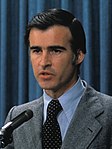| ||||||||||||||||||||||||||||||||||||||||||||||||||||||
4,201 delegates to the Democratic National Convention 2,101 (majority) votes needed to win | ||||||||||||||||||||||||||||||||||||||||||||||||||||||
|---|---|---|---|---|---|---|---|---|---|---|---|---|---|---|---|---|---|---|---|---|---|---|---|---|---|---|---|---|---|---|---|---|---|---|---|---|---|---|---|---|---|---|---|---|---|---|---|---|---|---|---|---|---|---|
| ||||||||||||||||||||||||||||||||||||||||||||||||||||||
Bill Clinton Jerry Brown Paul Tsongas Tom Harkin Bob Kerrey | ||||||||||||||||||||||||||||||||||||||||||||||||||||||
| ||||||||||||||||||||||||||||||||||||||||||||||||||||||
From February 10 to June 9, 1992, voters of the Democratic Party chose its nominee for president in the 1992 United States presidential election. Despite scandals and questions about his character, Arkansas Governor Bill Clinton won the nomination through a series of primary elections and caucuses culminating in the 1992 Democratic National Convention held from July 13 to July 16, 1992, in New York City. Clinton and Tennessee Senator Al Gore were nominated by the convention for president and vice president, respectively.
Clinton and Gore went on to take advantage of the chaos and disarray of the Reagan coalition and win the presidential election, defeating incumbent President George H. W. Bush and becoming the first Democratic nominee since Jimmy Carter to win a presidential election.






